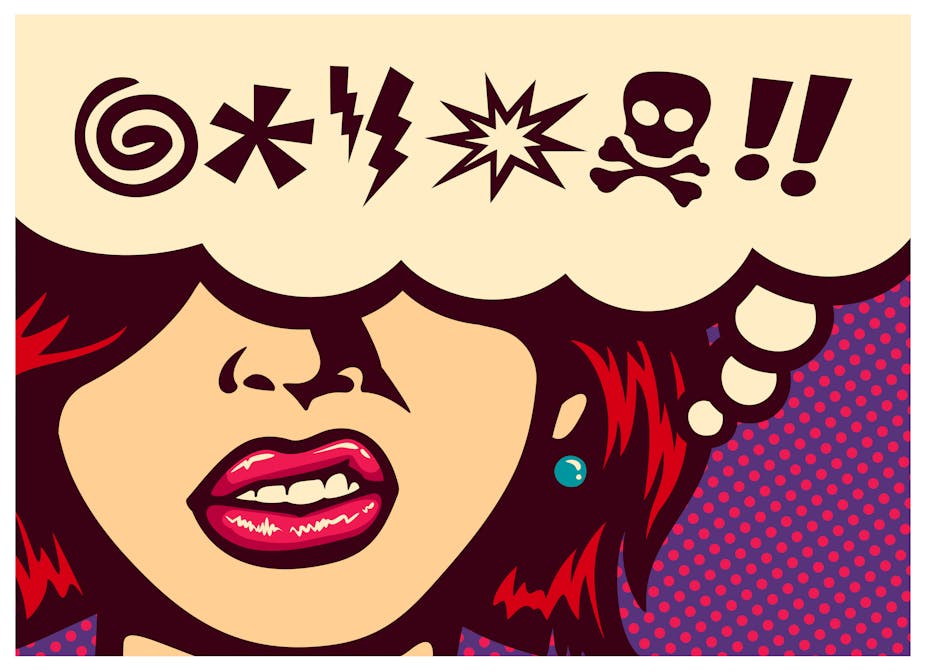Attempts to ban swearing in public places, in the workplace and even in the home appear to be on the rise.
The common thinking seems to be that people swear more and swear worse than they used to – and that this is a recent phenomenon. The apparent rise of profanity is easily ascribed to our language, interactions and society deteriorating under the bad influence of social media. This has to be stopped, the appalled guardians of “polite” behaviour argue, and the way to stop it is to impose bans, fines, sackings – or send us to bed without our dinner.
In response, those of us who find relief in using the occasional expletive will tirelessly cite studies suggesting that swearing is a sign not only of being more honest, healthier and better adjusted, but also that regular swearers are more intelligent and have a larger vocabulary than non-swearers.
All well and good, you might say. Go ahead and swear if you think it’ll reduce your blood pressure, increase your IQ and make you more eloquent – but don’t do it around me, in public or at work.
The problem is that attempts to legislate against any kind of verbal behaviour are doomed from the start. If a linguistic phenomenon becomes widespread and noticeable enough for someone to perceive the need to stop it, it has already caught on to such a degree that it will never be stamped out. Especially if it is a phenomenon that is eminently useful, which swearing is.
Why swearing works
Some of the reasons why that should be the case are obvious. Using swearwords is similar to highlighting a written phrase in flashing neon red. It grabs the attention and signals that you are not only absolutely serious about something, but that it is also emotionally important to you.
When you use a word that the people you are talking to aren’t expecting, it causes them to sit up and listen, and that can often bring your message home more effectively than if you had phrased it in a clear but neutral way. This noticeable effect is enhanced by the fact that swearing often consists of short words (they aren’t called “four-letter words” for nothing). They stand out from the context not only because of their content but also in terms of their intonation.
Swearing can also function as a safety valve, relieving emotional or even physical pressure. Research has found that people subjected to mild levels of pain (by putting their hands into a container of hot water) were able to withstand the discomfort longer and judged it to be less severe while uttering swearwords than while using neutral words.
These and many other studies on swearing show its beneficial aspects. But swearing is fascinating on a completely different level, too.
Trauma to the brain as a result of accident or injury, neurodegenerative illnesses or strokes often affect our ability to formulate messages. Needless to say, this loss of linguistic function is incredibly frustrating to the people experiencing it. They may have become unable to formulate even the simplest sentences, or retrieve basic words, but their intellectual abilities are often completely unaffected.

One of the oldest reported studies, conducted by Paul Broca in 1861, reports the case of a patient who, as a result of epilepsy, had almost entirely lost his ability to speak. While he was able to understand most of what was said to him, he only ever produced the nonsense monosyllable “tan”, except when he became so exasperated at his inability to communicate that he would exclaim “Sacré nom de Dieu!” (“Holy name of God” – or “For God’s sake!”).
Part of the foundation of language
The fact that someone who may no longer be able to put a name to an apple or a house can produce a fairly complex phrase such as “Holy name of God” suggests that swearing occurs at a more automatised level than general speech production, and in a different part of the brain – and that it can therefore not satisfactorily be replaced by a non-expletive sentence.
Nowadays, the expletive of choice would probably no longer be the name of God. The expressions that were spared by aphasia would probably get you in trouble in Cheshire, Dartford, Canterbury or any of the 15 British councils that have banned swearing. They would, however, allow such patients to vent their frustration at having lost all other linguistic function.
Swearing plays an important role in maintaining mental hygiene and sanity because it is associated with relieving unpleasant emotions, feelings and sensations. What’s more, people who became fluent in a foreign language later in life experience even the strongest swearwords as less taboo than the equivalent in their mother tongue. This suggests that the swearwords we acquired early, while we learned to speak, fundamentally connect us to our deepest emotions. Small children often delight in the shock they can produce by using simple words – even though they may have no idea what the word means or why it is so inappropriate – and these impressions stay with us.
Historical linguistics tells us that this has always been the case. The things we swore by have changed over the centuries from religious taboos to physical ones, and vary from country to country. In Dutch, if you want to insult someone badly you will tell them to contract a horrible disease, while in Chinese, if you are calling someone a show-off, you might say that they are blowing steam into the private parts of a cow.
Whatever the expletive of choice, the fact that people swear – and that others object to it – is probably as old as language itself. Wherever there is a substantial enough record of an ancient language, there is a record of swearing. Indeed, swearing is one of the most fundamental functions of language, which is why the Fry and Laurie sketch about made-up swearwords is so funny: we have no idea what the words (“Prunk”, “Cucking”, “Pempslider”) mean, but we know they are bad.
So when that policeman in Cheshire or Dartford or Canterbury tries to fine you, just tell them that you were swearing for purely medicinal reasons – and that they are fighting a battle that was lost thousands of years ago. Just don’t use any four-letter words while you do so.

